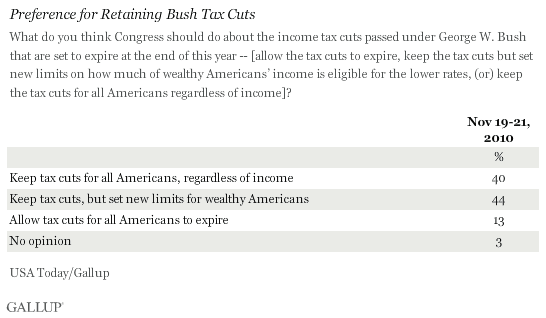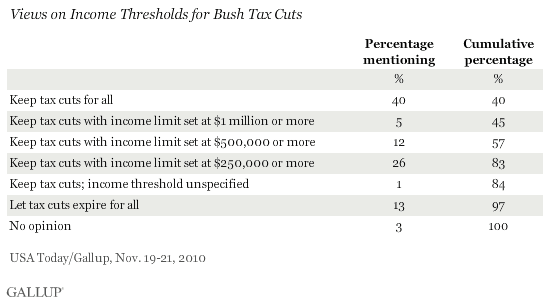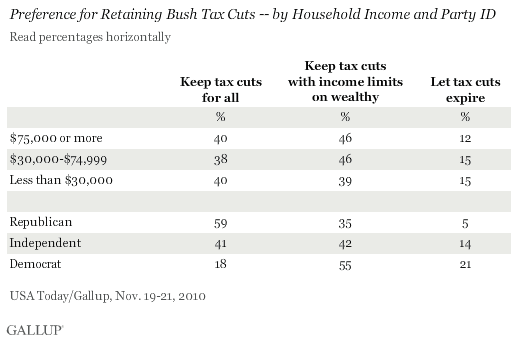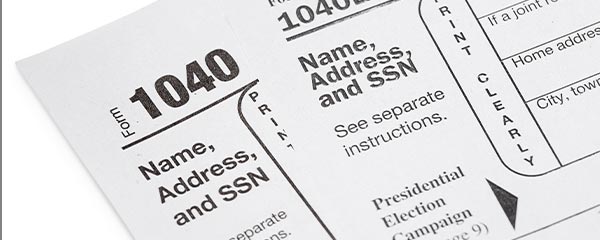PRINCETON, NJ -- As Congress considers what to do about the Bush tax cuts that are set to expire at the end of this year, Americans are sending a clear signal that they want them extended in some shape or form. Forty percent want Congress to maintain the tax cuts for everyone, while 44% support setting limits on how much of wealthy Americans' income is eligible for the lower rates.

A follow-up question clarifies where Americans would draw that income line, using some widely discussed income thresholds. Relatively few Americans -- 5% -- would set the cutoff for receiving the Bush tax rates at $1 million, but 12% would set it at $500,000. Combined with the 40% who want no income cutoff, this means a 57% majority of Americans believe the Bush tax cuts should fully apply to household income under $500,000. An additional 26% would set the income threshold at $250,000. Thus, 83% are in favor of retaining the tax cuts on income up to that figure.

Additionally, those who want to extend the Bush tax cuts are divided over whether to make the cuts temporary until the economy improves, or permanent. Among Americans overall, slightly more (45%) think the tax-cut extension should be temporary than say it should be permanent (37%). This is in addition to the 13% who want the tax cuts to expire.
Income Differences Are Mild
No more than 15% in any income group wants the Bush tax cuts to expire this year, while the rest are about evenly divided between wanting them extended for all versus extended with income limits on wealthy Americans. Also, similar percentages at each income level, between 50% and 57%, believe an extension of the Bush tax cuts should be temporary.
There are greater differences among political groups. Still, even on this basis, relatively few Democrats, independents, or Republicans are in favor of having the tax cuts expire. The majority of Republicans want the tax cuts extended for everyone, while the majority of Democrats want them extended with income eligibility limits. Independents are evenly divided between the two alternatives.

Additionally, 56% of Republicans think the tax cuts should be permanent while an even larger majority of Democrats, 69%, say they should be temporary.
The same USA Today/Gallup survey, conducted Nov. 19-21, finds Americans putting relatively high importance on having the lame-duck Congress extend the Bush tax cuts by year's end. Fifty percent rate this as a "very important" goal and another 31% call it "somewhat important." The only goal that ranks higher among six pressing issues before Congress that were tested in the survey is passing legislation to keep the estate tax from rising.
Of those who say extending the Bush tax cuts is very important to them, 55% are in favor of maintaining the tax cuts for all Americans. Additionally, 57% of this group wants the tax cuts extended permanently.
Bottom Line
With most Americans in favor of maintaining the Bush tax cuts at least for the middle class, the outgoing Congress has an uncommonly clear mandate in its final days. The challenge is in finding common ground on the details. Forty percent of Americans fundamentally agree with Republican congressional leaders who are striving to maintain the tax cuts for all income groups. Slightly more, 44%, are aligned with President Obama, who has said he is committed to setting limits on how much of wealthy Americans' income is eligible for the reduced tax rates. As the two sides continue to work toward a compromise, they should bear in mind that the least popular outcome would be doing nothing, thus letting the tax breaks expire altogether.
Survey Methods
Results for this USA Today/Gallup poll are based on telephone interviews conducted Nov. 19-21, 2010, with a random sample of 1,037 adults, aged 18 and older, living in the continental U.S., selected using random-digit-dial sampling.
For results based on the total sample of national adults, one can say with 95% confidence that the maximum margin of sampling error is ±4 percentage points.
Interviews are conducted with respondents on landline telephones (for respondents with a landline telephone) and cellular phones (for respondents who are cell phone-only). Each sample includes a minimum quota of 150 cell phone-only respondents and 850 landline respondents, with additional minimum quotas among landline respondents for gender within region. Landline respondents are chosen at random within each household on the basis of which member had the most recent birthday.
Samples are weighted by gender, age, race, education, region, and phone lines. Demographic weighting targets are based on the March 2009 Current Population Survey figures for the aged 18 and older non-institutionalized population living in continental U.S. telephone households. All reported margins of sampling error include the computed design effects for weighting and sample design.
In addition to sampling error, question wording and practical difficulties in conducting surveys can introduce error or bias into the findings of public opinion polls.
View methodology, full question results, and trend data.
For more details on Gallup's polling methodology, visit www.gallup.com.
